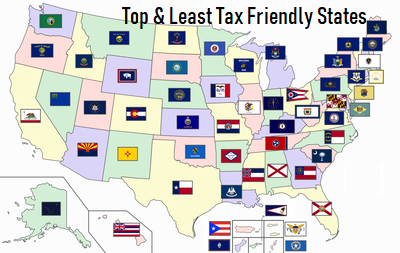The 10 Top and Least Tax Friendly States in US For Small Businesses


Last year's tax filing season was more nerve-racking than most. It was the first time we had to deal with all the federal tax code changes made by the 2017 tax reform law. U.S. tax rates were lowered, standard deductions were doubled, itemized deductions were limited, and personal exemptions were repealed. Most people did not understand if they would get a refund or owe taxes until they completed their 1040.
To aid small business owners and entrepreneurs in making the best decision possible, the Tax Foundation recently released the State Business Tax Climate Index for 2020, which ranks states according to how well their tax systems are structured. This index revealed that Wyoming and South Dakota are the best states for small business taxes, while New Jersey and New York are the worst.
While ranking the states is never easy, especially since each has a different tax system, the Tax Foundation conducted its index analysis by comparing over 100 variables in these five major categories:
Corporate taxes
Individual income taxes
State taxes
Unemployment insurance taxes
Property taxes
According to the Tax Foundation's analysis, many of the top 10 states for taxes share the absence of a major tax. Wyoming, Nevada (which has gross receipts taxes) and South Dakota have no corporate or individual income tax. Alaska does not have the individual income or sales tax at the state level, and there's no income tax in Florida. Oregon, New Hampshire, and Montana have no sales tax
This does not mean that a state cannot rank in the top 10 while still levying all the major taxes. Indiana and Utah, for example, levy all of the major tax types, but with low rates on broad bases.
The 10 best states for small business taxes in 2020
- Wyoming
Corporate tax rank: 1 (no income tax levied)
Individual income tax rank: 1 (no income tax levied)
Sales tax rank: 6
Property tax rank: 39
Unemployment tax rank: 27
- South Dakota
Corporate tax rank: 1 (no income tax levied)
Individual income tax rank: 1 (no income tax levied)
Sales tax rank: 35
Property tax rank: 22
Unemployment tax rank: 44
- Alaska
Corporate tax rank: 26
Individual income tax rank: 1 (no income tax levied)
Sales tax rank: 5
Property tax rank: 25
Unemployment insurance tax rank: 46
- Florida
Corporate tax rank: 9
Individual income tax rank: 1 (no income tax levied)
Sales tax rank: 23
Property tax rank: 13
Unemployment tax rank: 2
- Montana
Corporate tax rank: 21
Individual income tax rank: 25
Sales tax rank: 3
Property tax rank: 12
Unemployment tax rank: 20
- New Hampshire
Corporate tax rank: 43
Individual income tax rank: 9
Sales tax rank: 1
Property tax rank: 44
Unemployment tax rank: 45
- Nevada
Corporate tax rank: 25
Individual income tax rank: 5
Sales tax rank: 44
Property tax rank: 10
Unemployment tax rank: 47
- Oregon
Corporate tax rank: 33
Individual income tax rank: 38
Sales tax rank: 4
Property tax rank: 18
Unemployment tax rank: 36
- Utah
Corporate tax rank: 12
Individual income tax rank: 10
Sales tax rank: 22
Property tax rank: 5
Unemployment tax rank: 15
- Indiana
Corporate tax rank: 11
Individual income tax rank: 15
Sales tax rank: 20
Property tax rank: 2
Unemployment tax rank: 25
"Texas levies no personal income taxes, which is a boon for sole proprietors and pass-through business owners," he said. "It has a margin tax on businesses, but your business isn't on the hook for this unless it has more than $1,130,000 in annual gross receipts for the year, meaning that many small business owners will essentially pay no state-level tax on their business income.
On the flip side, New Jersey and California are among the worst states for small business taxes, because research shows that business owners who live there pay twice as much as they would somewhere else.
The 10 worst states for small business taxes in 2020
- New Jersey
Corporate tax rank: 49
Individual income tax rank: 50
Sales tax rank: 42
Property tax rank: 47
Unemployment tax rank: 30
- New York
Corporate tax rank: 13
Individual income tax rank: 48
Sales tax rank: 43
Property tax rank: 46
Unemployment tax rank: 38
- California
Corporate tax rank: 28
Individual income tax rank: 49
Sales tax rank: 45
Property tax rank: 16
Unemployment tax rank: 22
- Connecticut
Corporate tax rank: 27
Individual income tax rank: 43
Sales tax rank: 26
Property tax rank: 50
Unemployment tax rank: 21
- Arkansas
Corporate tax rank: 34
Individual income tax rank: 40
Sales tax rank: 46
Property tax rank: 29
Unemployment tax rank: 23
- Minnesota
Corporate tax rank: 44
Individual income tax rank: 46
Sales tax rank: 28
Property tax rank: 26
Unemployment tax rank: 34
- Vermont
Corporate tax rank: 45
Individual income tax rank: 39
Sales tax rank: 16
Property tax rank: 49
Unemployment tax rank: 16
- Maryland
Corporate tax rank: 32
Individual income tax rank: 45
Sales tax rank: 19
Property tax rank: 42
Unemployment tax rank: 33
- Iowa
Corporate tax rank: 48
Individual income tax rank: 42
Sales tax rank: 15
Property tax rank: 35
Unemployment tax rank: 35
- Louisiana
Corporate tax rank: 37
Individual income tax rank: 32
Sales tax rank: 48
Property tax rank: 33
Unemployment tax rank: 4
The states in the bottom 10 seem to have some afflictions in common: complex, non-neutral taxes with comparatively high rates. New Jersey, for example, is hampered by some of the highest property tax burdens in the country, the second-highest corporate income tax rate in the country and particularly the aggressive treatment of international income. The Garden State also levies an inheritance tax and maintains some of the worst-structured income taxes in the US.
New Jersey has some of the highest property tax burdens in the country and the second highest-rate corporate income tax in the country. The state also levies an inheritance tax and has some of the nation’s worst-structured individual income taxes





















 TrustGuard - PCI Security Scanner
TrustGuard - PCI Security Scanner
